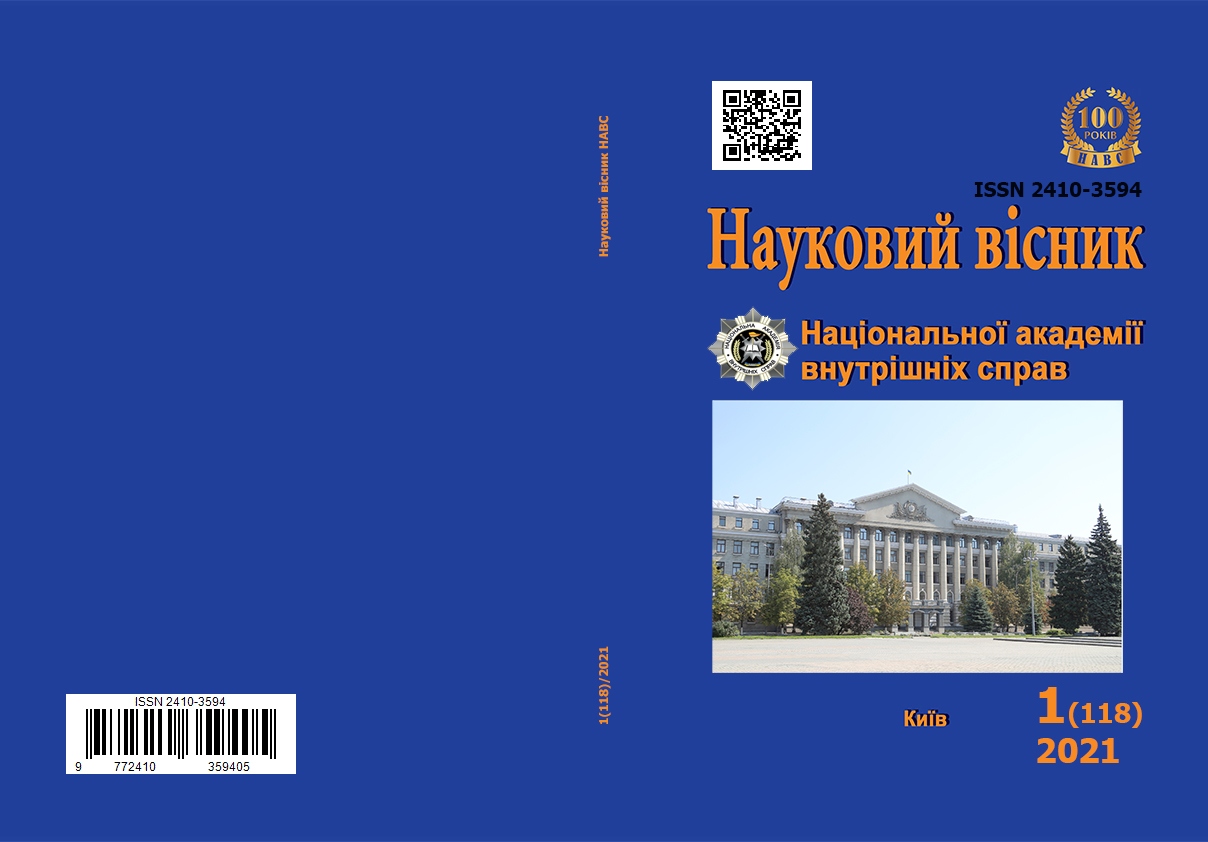Special Knowledge in Polygraphology and their Features
Abstract
The purpose of the study – is to highlight the issue of special knowledge in the newly formed interdisciplinary science of polygraphy with an emphasis on their features. Methodology. The methodological tools are chosen taking into account the goal, the specifics of the object and subject of research. It is a general dialectical method of scientific knowledge of real phenomena, as well as their connection with the theory and practice of applying special knowledge in the field of polygraph. Also special research methods, namely: the method of system analysis, comparative law, system-structural and forecasting method. Scientific novelty. For the first time among domestic and foreign researchers the scientific opinion concerning special knowledge in the field of polygraph is substantiated. Their content and features are revealed. Emphasis is placed on the problematic issues that currently exist in polygraph activities and slow down the full process of entry of this field of knowledge into public relations. Conclusions. The scientific position is substantiated that polygraphology is practically a new, fully formed branch of knowledge, which, accumulating the achievements of a number of other sciences, builds its own vision on the issue of special knowledge. They can be defined as specific, possessed by a limited number of specialists in this field and are not publicly available and well-known to most entities that use such results. It is proved that a polygraph examiner can demonstrate special knowledge when he is involved in specific research in a particular field or field of activity and, usually, during psychophysiological examinations using a polygraph, and in particular in criminal proceedings. As for the problematic issues of this field and their solution, they relate to the inconsistency of the conceptual apparatus, the lack of unification of methods of polygraph research, the lack of common approaches in drawing conclusions, etc., which ultimately introduces an imbalance in relation to the polygraph and research. application, including the formation of special knowledge in this field.
Keywords: polygraph; polygraph; polygraph specialist; expert; special knowledge; non-procedural and procedural form; forensic psychophysiological examination.
Downloads
References
Эйсман А. А. Заключение эксперта (структура и научное обоснование). М. : Юрид. лит., 1967. 152 с.
Gołaszewski M. Report from the 54th Seminar of the American Polygraph Association. European Polygraph. 2019. Vol. 13. No. 3 (49). P. 161–165. doi: 10.2478/ep-2019-0012.
Гончаренко В. Г. Спеціальні знання: генезис, предмет, рівні, форми використання в доказуванні. Вісник Академії адвокатури України. 2007. № 2 (9). С. 22–34.
Horvath F. A Hundred Years of Polygraphy: Some Primary Changes and Related Issues. European Polygraph. 2020. Vol. 14. No. 1 (51). P. 30–43. doi: 10.2478/EP-2020-0007.
Kormos M. Polygraph. Examinations in the Department of Special Psychology o f the Ministry o f the Interior o f the Slovak Republic – a Retrospective View. European Polygraph. 2017. Vol. 11. No. 3 (41). P. 120–127. doi: 10.1515/ep-2017-0012.
Лазебний А. М. Використання спеціальних знань при розслідуванні кримінальних правопорушень проти громадського порядку : автореф. … дис. канд. юрид. наук : 12.00.09. Ірпінь, 2016. 24 с.
Лисиченко В. К., Циркаль В. В. Использование специальных знаний в следственной и судебной практике : учеб. пособие. Киев : Киев. ун-т, 1987. 100 с.
Лук’янчиков Є. Д., Лук’янчиков Б. Є., Петряєв С. Ю. Використання спеціальних знань у кримінальному провадженні. Вісник Національного технічного університету України «Київський політехнічний інститут». 2019. Вип. 4 (44). С. 125–130. (Серія «Політологія. Соціологія. Право»).
Максимів Л. В. Висновок експерта як джерело доказів у кримінальному провадженні: окремі аспекти. Теорія і практика судової експертизи і криміналістики : матеріали ІІІ Всеукр. наук.-практ. конф. (Київ, 27 лют. 2020 р.). Київ ; Маріуполь, 2020. 328 с.
Мединська Л. В. Використання спеціальних знань у кримінальному провадженні України. Прикарпатський юридичний вісник. 2014. Вип. 2 (5). С. 278–286.
Михеєнко М. М., Шибіко В. П., Дубинський А. Я. Кримінально-процесуальний кодекс України : наук.-практ. комент. Київ : Юрінком Інтер, 1995. 639 с.
Оцінка висновку експерта. Велика українська юридична енциклопедія / [редкол.: В. Ю. Шепітько (голова) та ін.]. Київ : Ін-т держави і права ім. В. М. Корецького НАН України, 2018. Т. 20 : Криміналістика, судова експертиза, юридична психологія. 952 с.
Stanley M. S. Critical Changes Over the 100 Year Evolution of Polygraph Practices. European Polygraph. 2020. Vol. 14. No. 1 (51). P. 50–57. doi: 10.2478/EP-2020-0010.
Widacki J., Szuba-Boron A. Polygraph. Examinations of Civil Servants in Poland. European Polygraph. 2017. Vol. 11. No. 1 (39). P. 15–23. doi: 10.1515/ep-2017-0002.
Якіміва В. С., Паруша А. Ю. Спеціальні знання та їх межі: актуальне питання теорії судової експертизи. Теорія і практика судової експертизи і криміналістики : матеріали ІІІ Всеукр. наук.-практ. конф. (Київ, 27 лют. 2020 р.). Київ ; Маріуполь, 2020. 328 с.
Ярослав Ю. Ю. Оцінка висновку експерта за допомогою спеціальних знань. Судово-психологічна експертиза. Застосування поліграфа та спеціальних знань в юридичній практиці. 2019. № 3 (19). URL: https://goo.su/0iVw.
Про судову експертизу : Закон України від 25 лют. 1994 р. № 4038-XII. URL: http://zakon2.rada.gov.ua/ laws/show/4038-12.
Abstract views: 183 PDF Downloads: 239
- Authors reserve the right to authorship of their own work and transfer to the magazine the right of the first publication of this work under the terms of the Creative Commons Attribution License, which allows other persons to freely distribute published work with mandatory reference to authors of the original work and the first publication of an article in this magazine.
- Authors have the right to enter into separate additional agreements on non-exclusive dissemination of the work in the form in which it was published in the journal (for example, to post an article in the institution's repository or to publish as part of a monograph), provided that the link to the first publication of the work in this journal is maintained.
- The journal's policy allows and encourages the posting of articles by authors on the Internet (for example, in electronic storehouses of institutions or on personal websites), both before the submission of this manuscript to the editorial office and during its editorial processing, as this contributes to the creation of a productive scientific discussion and positively affects the efficiency and dynamics of citing the published work.




